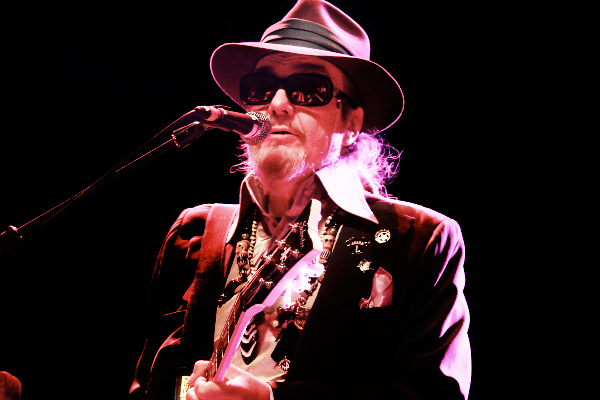
photo: James Demaria Productions
Dr. John may have started out freaky, but the New Orleans native has spent most of the past 40 years as a conventional, albeit superb, R&B pianist and singer. It took the Black Keys’ Dan Auerbach to make him sound strange again.
Auerbach produced Dr. John’s latest record, Locked Down, which won this year’s Grammy Award for Best Blues Record. (The good doctor will perform two shows this Wednesday at Space in Evanston.) In addition to recalling the psychedelic-tinged sound of Dr. John’s early recordings, it’s also an illustration of the transformative role a producer with a strong vision can have on an artist, even one who, like the 72-year-old Dr. John, has a long-established sound.
A New Orleans native’s real name is Malcolm “Mac” Rebennack. He began his career as a teenage session musician and made his solo debut calling himself and his 1968 record the Night Tripper. That album and his other early releases drew on the voodoo traditions prevalent in his hometown for their spooky chants, woodwinds, and off-kilter rhythms. Dr. John’s concerts likewise emulated voodoo ceremonies, incorporating traditional costumes and headdresses—a look he re-embraced for his performance with the Black Keys at this year’s Grammy Awards ceremony.
By his 1973 record, In the Right Place, which yielded his lone pop hit, “Right Place, Wrong Time,” Dr. John largely had abandoned the voodoo trappings to deliver straightforward Crescent City boogie. His records ever since have proceeded in a similar vein, with occasional detours into jazz, and are reliably tasteful and enjoyable but rarely surprising. The nearest he’s come to his original sound in the past 40 years was 1998’s Anutha Zone, which teamed him up with admiring British rockers including Paul Weller and Spiritualized’s Jason Pierce, but the results were more spacey than swampy.
A longtime fan, Auerbach approached Dr. John a few years ago about producing a record that would hearken back to his early work. The Black Keys guitarist himself knows something about the impact the right producer can have, since his band enlisted Danger Mouse to produce two of their last three records, which greatly expanded their sound.
Auerbach took familiar elements of Big Easy funk—chicken scratch guitar, honking baritone saxophone, the call and response choruses of female background singers—and put them through a house of mirrors. On “Big Shot,” the vocalists sound spectral, and the horns burst forth like ghosts popping out of walls.
In addition, Auerbach persuaded Dr. John to add an element of early ’70s Ethiopian music to Locked Down and recruited musicians experienced playing in that style to help write and record the songs. “You Lie” finds Dr. John delivering an insistent chant over a slinky Afrobeat guitar groove and pumping horns, to incantatory effect.
Furthering the Ethiopian flavor, Auerbach convinced Dr. John to trade piano for Farfisa organ—which he hadn’t played since the late 1960s—adding to the music’s careening quality and overall funkiness. The record reaches a hallucinatory peak on “Ellgua,” a song Dr. John has said comes “from the spirit kingdom,” as he sings in a strange voodoo patois amid tumbling drums, a flurrying flute, and the background singer’s chants.
When Auerbach first approached Dr. John, he told him he wanted to produce the best record he’d made in a long time. He succeeded. Thanks to Auerbach’s guidance, on Locked Down, Dr. John sounds wilder and more vital than he has in decades.
Dr. John performs Apr. 17 at SPACE, 1245 Chicago Ave. Evanston, evanstonspace.com. $38 to $78
Kevin McKeough is a contributing music critic for Chicago magazine.


